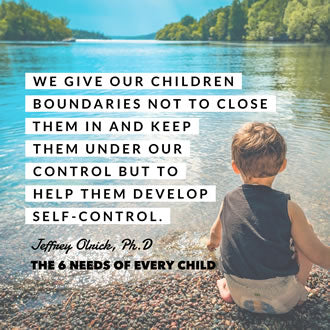 By Jeffrey Olrick, Ph.D.
By Jeffrey Olrick, Ph.D.
As you navigate through life together, you’ll have ample opportunities to offer your child natural consequences when they cross a boundary or make a poor choice. For instance, you and your kid may agree that he can do his chores on the weekend, as long as they’re all done by bedtime on Sunday. If Sunday night comes and his chores aren’t done, the next weekend he’ll need to complete them before doing anything else on Friday night.
If you’ve mapped this out ahead of time, this won’t be a surprise because the two of you will have already agreed on consequences if he didn’t follow through.
But there are other times when more serious breaches of trust and respect occur, breaches that require a more careful consideration of the boundaries you have with your child. In these cases, you’ll need to reassess the privileges and trust you have given your child.
Perhaps your child has broken boundaries having to do with her online activity, knowingly engaging with harmful material or purchasing things without permission. Perhaps your teenager has lied about his whereabouts on a weekend sleepover. Perhaps your child has written hurtful comments online about another peer or passed along inappropriate content.
In such cases, serious conversations need to occur. Your goal should be to gather information, see things from your child’s view, share how others may be experiencing the situation, including yourself, and seek reconciliation. This is how you can map a way forward with a clear affirmation of personal boundaries and expectations.
In more serious boundary breaches, it is valuable to our children to feel the weight of their actions and to work to regain trust and standing. There can be consequences that last beyond an uncomfortable conversation. But if you want to foster a positive learning experience, make the consequences as restorative and natural as possible.
Your child may have to lose privileges until concrete signs of trust and responsibility have been reestablished. To make consequences tangible, you might insist that she work to repay someone, write out an apology, do community service, or research an issue, depending on the situation.
In these cases, when things feel hard and even impossible, try not to despair. Remember growth trust (i.e., intuitively trusting that your child will eventually grow, mature, and integrate herself with the world around her as long as she has basic opportunities for stimulation, learning, nurture, and structure — discussed in my book The 6 Needs of Every Child) and that your child’s brain will do the work it needs to do to develop and organize itself to succeed in the world with others, especially if you walk with her to find a way forward when she seems lost in her mistakes.
A growth trust mind-set will help you embrace each of these strategies for thinking about and enforcing boundaries with your child because growth trust presumes that your child is invested in more than just getting his own way. It presumes that your child wants things to go well for him with others, not just for him alone. And this point of view is completely justified in light of the essential need all humans have to stay connected to others.
Our genes tell us that rejection, especially by our caregivers, is an invitation to death. Our survival has always depended primarily on staying in the good graces of our clan. We may push the limits of rejection, but we don’t want to go so far that we get kicked out. The urge to have our way is strong in all of us, but somewhere inside most every child is the desire for a win-win and for both of you to be happy with your experiences together.
If you find yourself powering up—relishing in a position of exerting power over your child or acting out a pattern from your childhood that taught you boundaries but left you feeling small—then I encourage you to rethink. Remember the call of relationship and that we give our children boundaries not to close them in and keep them under our control but to help them develop self-control and to direct them toward paths of healthy discovery and abundant life alongside others.
There is a promise that runs through the Judeo-Christian faith story. It’s a promise that one day there will come a time when love toward neighbor will not be a rule that people follow out of guilt or fear but because it is written on their hearts.
Some people believe that this promise will come to pass only in some future age, when God changes us in some sudden spiritual transformation. But perhaps such an age is available to us now, in the life and wisdom of the Spirit. If we let it, that Spirit will work through us to write the laws of love of self and others on our children’s hearts as we do the hard and patient work of giving them the gift of healthy boundaries.
Adapted from The 6 Needs of Every Child: Empowering Parents and Kids through the Science of Connection by Amy Elizabeth Olrick and Jeffrey Olrick, Ph.D. Click here to learn more about this book.
Jeffrey Olrick, Ph.D., is a clinical psychologist who specializes in working with children and families. Dr. Olrick has over twenty years of experience working in a variety of settings, including the University of Virginia, residential treatment, the public school system, community mental health, and private practice. He lives in New Zealand with his wife and their three children.
Boundaries with Kids also addresses how to use healthy boundaries to help your children make healthy choices.
➡️ Get The 10 Laws of Boundaries eBook when you subscribe to the Boundaries Weekly email newsletter. Learn More
